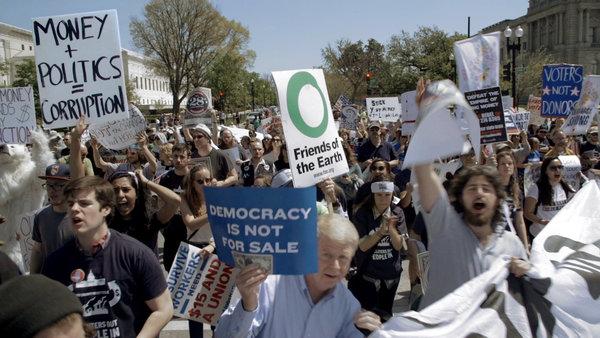Money in politics has long been a controversial issue in America, but its importance has surged since the Supreme Court’s 2010 Citizens United decision opened the floodgates, allowing corporations and other groups with anonymous funding to spend unlimited amounts on political advertising in the name of free speech. Critics of the decision cite the corrupting influence this spending could have on elected politicians at both the national and local levels. The new PBS documentary Dark Money (premiering today, October 1st) explores this issue from right here in Montana, which has a unique and fascinating history with campaign finance laws closely related to the state’s natural resource abundance. The film recounts some of this history and follows a local journalist as he uncovers a corruption scandal that eventually led to the prosecution of former state congressman Wesley Prouse. I caught an advanced screening of Dark Money in Bozeman a few weeks ago and highly recommend it.
Montana was at the vanguard of campaign finance reform over 100 years ago, when it passed the Corrupt Practices Act of 1912. This severely restricted the amount that corporations could donate to state-level campaigns. The law was passed after Montana residents became fed up with the wealthy “Copper Barons” that effectively controlled the state government through blatantly corrupt financial transactions. The law remained in effect until 2011, when the US Supreme Court ruled that the law was inconsistent with their ruling on Citizens United in a follow-up case called Western Tradition Partnership, Inc. v. Montana. Montana responded in 2015 by passing the bipartisan Disclose Act, which does not impose campaign funding limits, but requires that all groups spending money on political communication disclose the names of its funders. This law has itself been subject to legal challenges but so far remains intact.
The film spends time lingering on the infamous Berkely Pit in Butte, the former open-pit copper mine where thousands of geese have been killed by the toxic fumes in recent years. The pit is presented as a gaping manifestation of the downsides of allowing resource extraction interests too much influence over government. Montana is not alone in having a rocky history with this type of problem. In the early 1900s in West Virginia, coal executives and politicians were often literally the same people. Coal companies were allowed to extract the state’s natural wealth and haul it off to coastal metropolises without much lasting benefit to West Virginia itself, and today the state is one of the poorest and most environmentally damaged in the country. Earlier this year teachers there, and in fellow energy-rich states Kentucky and Oklahoma, organized massive strikes, demanding more education funding financed by higher taxes on energy production.
Why do energy and mining companies seem to influence governments to a high degree relative to most other corporate sectors? I believe there are at least a couple reasons. First, the nature of resource extraction makes it subject to various market failures. Environmental damage is a negative externality that is not factored into the market price of oil and minerals, and resources often exist underneath public lands that have other non-market benefits to society (like national and state parks). This means that resource extraction is heavily regulated relative to most sectors, creating an incentive for companies to seek influence over the government in order to ease regulations. Second, resource-rich governments can become dependent on resource revenues. Energy-rich states impose “severance” taxes on energy production that partly substitute for the more traditional income and property taxes, which can create a co-dependency between energy companies and the government. Further, too much reliance on energy-based tax revenues is highly risky given the volatility of commodity prices. The crash in oil and coal prices in recent years are largely responsible for the public budget problems in the teacher-strike states mentioned above.
Montana has historically not been immune from these kinds of problems, but has arguably done more legislatively to protect itself against the possible corrupting influence of anonymous campaign funding than any other state. After Citizens United, this will be a long and ongoing battle.

